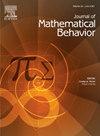理解数学条件:以哲学、语言学和心理学为基础的教育视角
IF 1.7
Q3 EDUCATION & EDUCATIONAL RESEARCH
引用次数: 0
摘要
条件句——“如果A则B”形式的句子——在数学中无处不在,除非A为真,B为假,否则它们被视为真。条件句在日常生活中也无处不在,但有不同的解释。这给学生们带来了挑战,他们必须学习一种可能感觉不自然的解释。我们如何帮助他们进行数学上有效的推理?在这篇理论论文中,我认为一个合理的答案应该建立在哲学、语言学和心理学的基础上。我将这些领域的工作应用到数学学习中,特别是过渡到证明的部分。我认为,数学条件的日常使用反映了对日常条件的共同推理阅读,因此对数学条件的有效解释可能:根据真值功能讨论物质条件的特性;请注意,普遍的数学条件是合理地服从于推理的阅读;巩固习惯性的反例搜索。本文章由计算机程序翻译,如有差异,请以英文原文为准。
Understanding mathematical conditionals: An educational perspective informed by philosophy, linguistics and psychology
Conditionals – sentences of the form ‘if A then B’ – are ubiquitous in mathematics, where they are treated as true unless A is true and B is false. Conditionals are ubiquitous in everyday life, too, but there interpretations vary. This creates a challenge for students, who must learn an interpretation that might feel unnatural. How can we help them toward mathematically valid reasoning? In this theoretical paper, I argue that a sensible answer should build on work in philosophy, linguistics and psychology. I apply work from these fields to mathematical learning, especially at the transition to proof. I argue that day-to-day use of mathematical conditionals reflects the common inferential reading of everyday conditionals, so that an effective explanation of mathematical conditionals might: discuss the peculiarities of the material conditional, with reference to truth-functionality; observe that universal mathematical conditionals are sensibly subject to an inferential reading; and entrench habitual counterexample search.
求助全文
通过发布文献求助,成功后即可免费获取论文全文。
去求助
来源期刊

Journal of Mathematical Behavior
EDUCATION & EDUCATIONAL RESEARCH-
CiteScore
2.70
自引率
17.60%
发文量
69
期刊介绍:
The Journal of Mathematical Behavior solicits original research on the learning and teaching of mathematics. We are interested especially in basic research, research that aims to clarify, in detail and depth, how mathematical ideas develop in learners. Over three decades, our experience confirms a founding premise of this journal: that mathematical thinking, hence mathematics learning as a social enterprise, is special. It is special because mathematics is special, both logically and psychologically. Logically, through the way that mathematical ideas and methods have been built, refined and organized for centuries across a range of cultures; and psychologically, through the variety of ways people today, in many walks of life, make sense of mathematics, develop it, make it their own.
 求助内容:
求助内容: 应助结果提醒方式:
应助结果提醒方式:


